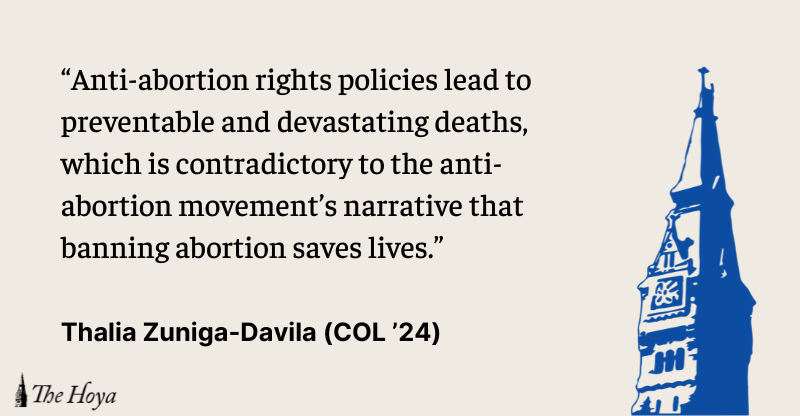CW: This article references sexual assault. Please refer to the end of the article for on- and off-campus resources.
Texas Senate Bill 8, which prohibits all abortions after six weeks, even for survivors of rape and incest, went into effect Sept. 1. The law also allows private citizens to sue abortion providers, people seeking abortions and anyone who aids in the process of receiving or providing abortion services. This policy is not shocking or unprecedented:
States have interfered in abortion health care for decades, and this development is one of many restrictive policies anti-abortion rights activists have pushed for in recent years.
The term “Heartbeat Act” is fundamentally misleading; at six weeks, there is no heartbeat in the fetus — only cardiac activity that produces rhythmic electrical impulses sounding similar to a heartbeat. Such fallacious information fortifies the idea that abortion is inherently correlated with the removal of a life. Prohibiting abortion after six weeks is overly restrictive, especially since clinical symptoms of pregnancy occur after this deadline for most people. For those with irregular menstrual cycles, this deadline is even more unreasonable.
In addition, any lawsuits over the abortion ban would involve private citizens directly suing each other instead of government officials and agencies. Because the bill allows private citizens to sue people seeking abortions and anyone who may have contributed to the process of an abortion, it is almost impossible for pro-abortion rights activists to challenge legally.
Further, this Heartbeat Act continues the harmful governmental history of enacting laws that disproportionately hurt people of color. Implementing yet another restrictive abortion policy will place further burdens on minority communities residing in Texas. For example, the Rio Grande Valley, an area in the state with a large Latinx and immigrant population, is a perfect example of the obstacles in the health care system that the new law will unequivocally worsen. The region only has one abortion center — the Whole Woman’s Health clinic — to serve a population of 1.1 million people. The community also lacks an accessible transportation system, meaning residents must arrange long and difficult transportation to access reproductive services. Long wait periods add complications that further restrict the already narrow window for receiving abortions. Traveling out of state to receive abortion services is also impossible; because the Rio Grande Valley stretches along the southern border, there are checkpoints that demand proof of citizenship or residence to travel. Even if an individual learns of the pregnancy within the six-week time frame, the law forces undocumented immigrants in this region to carry the pregnancy to term or attempt self-abortion.
Texas also has one of the highest maternal mortality rates for Black women in the country. Considering the already high maternal mortality rate, the newly implemented law will only highlight the deep-seated racism that exists in the health care system by making abortion health care inaccessible and more difficult to recieve. Additionally, low-income immigrants and people of color in Texas often work in jobs that lack basic worker protections, including health care. These obstacles create similar circumstances to those in the Rio Grande Valley and force people into potentially fatal dilemmas when they are unable to access abortions and reproductive health care.
The reality is that abortion restrictions do not reduce the number of abortions overall. In regions where abortion is limited, the number of unintended pregnancies that end in abortion increase by 39%. Thus, when secure medical abortions are restricted, dangerous abortion alternatives take their place. Medically unsafe abortions have led to an estimated 23,000 preventable deaths every year. Anti-abortion rights policies lead to preventable and devastating deaths, which is contradictory to the anti-abortion movement’s narrative that banning abortion saves lives. As more states continue to challenge Roe v. Wade, it is more important than ever to highlight just how dangerous it is to undermine a person’s right to choose and bodily autonomy.
As members of the Georgetown University community, we are not helpless in the fight against restrictions on reproductive rights. Call representatives to demand their support for The Women’s Health Protection Act, which seeks to protect reproductive rights at the federal level; donate to clinics like Access Esperanza, which provide cheap and free contraceptives to the Rio Grande Valley; and contribute monetary donations to mutual aid funds like Frontera Fund to help low-income Latinx individuals afford abortions in Texas. We can fund community networks that seek to undo the damage that abortion restrictions cause low-income BIPOC. We can fight for our rights.
Thalia Zuniga-Davila is a sophomore in the College.
Resources: On-campus resources include Health Education Services (202-687-8949) and Counseling and Psychiatric Service (202-687-6985)); additional off-campus resources include the D.C. Rape Crisis Center (202-333-7273) and the D.C. Forensic Nurse Examiner Washington Hospital Center (844-443-5732). If you or anyone you know would like to receive a sexual assault forensic examination or other medical care — including emergency contraception — call the Network for Victim Recovery of D.C. (202-742-1727). To report sexual misconduct, you can contact Georgetown’s Title IX coordinator (202-687-9183) or file an online report here. Emergency contraception is available at the CVS located at 1403 Wisconsin Ave NW and through H*yas for Choice. For more information, visit sexualassault.georgetown.edu.














